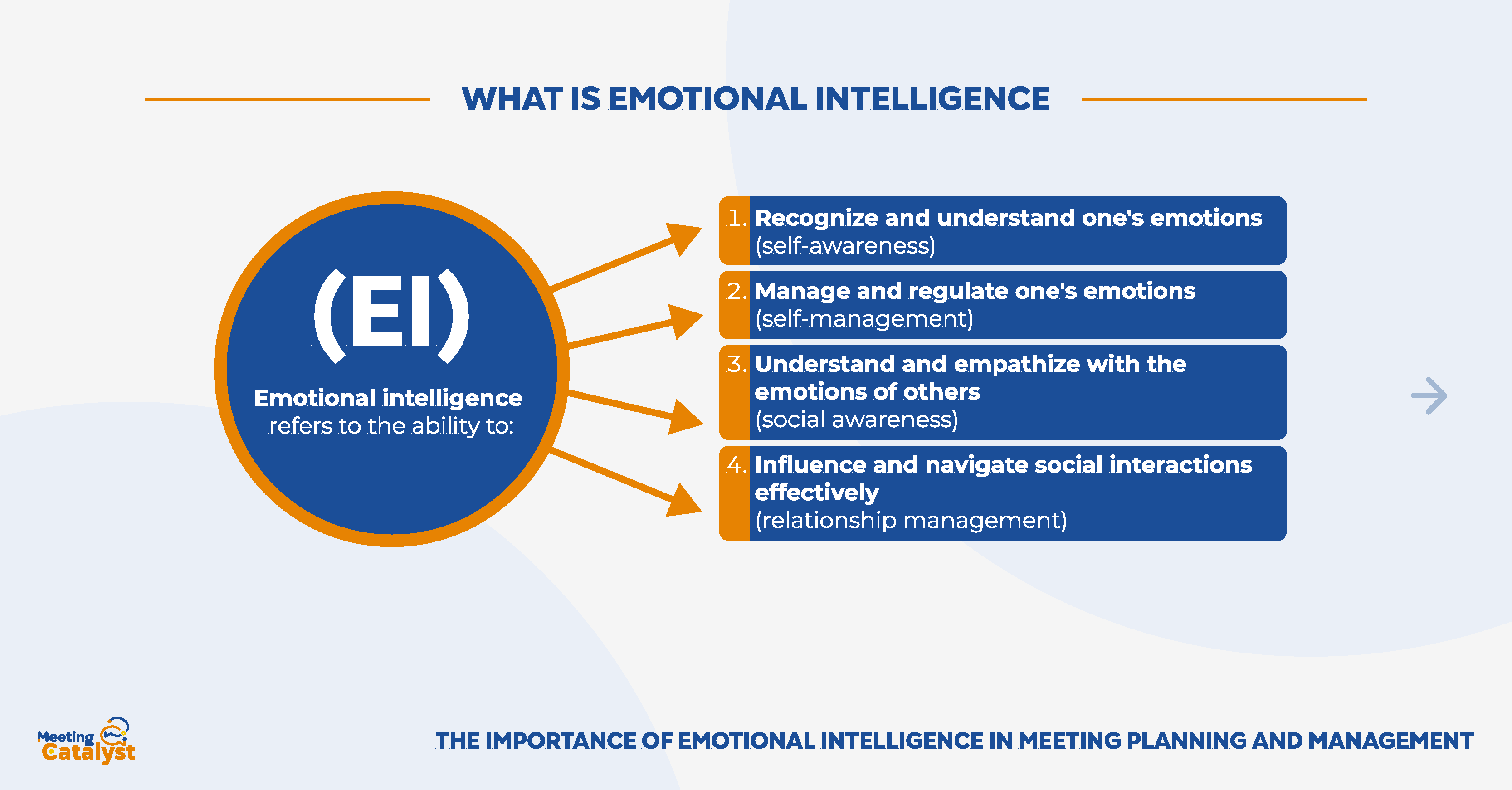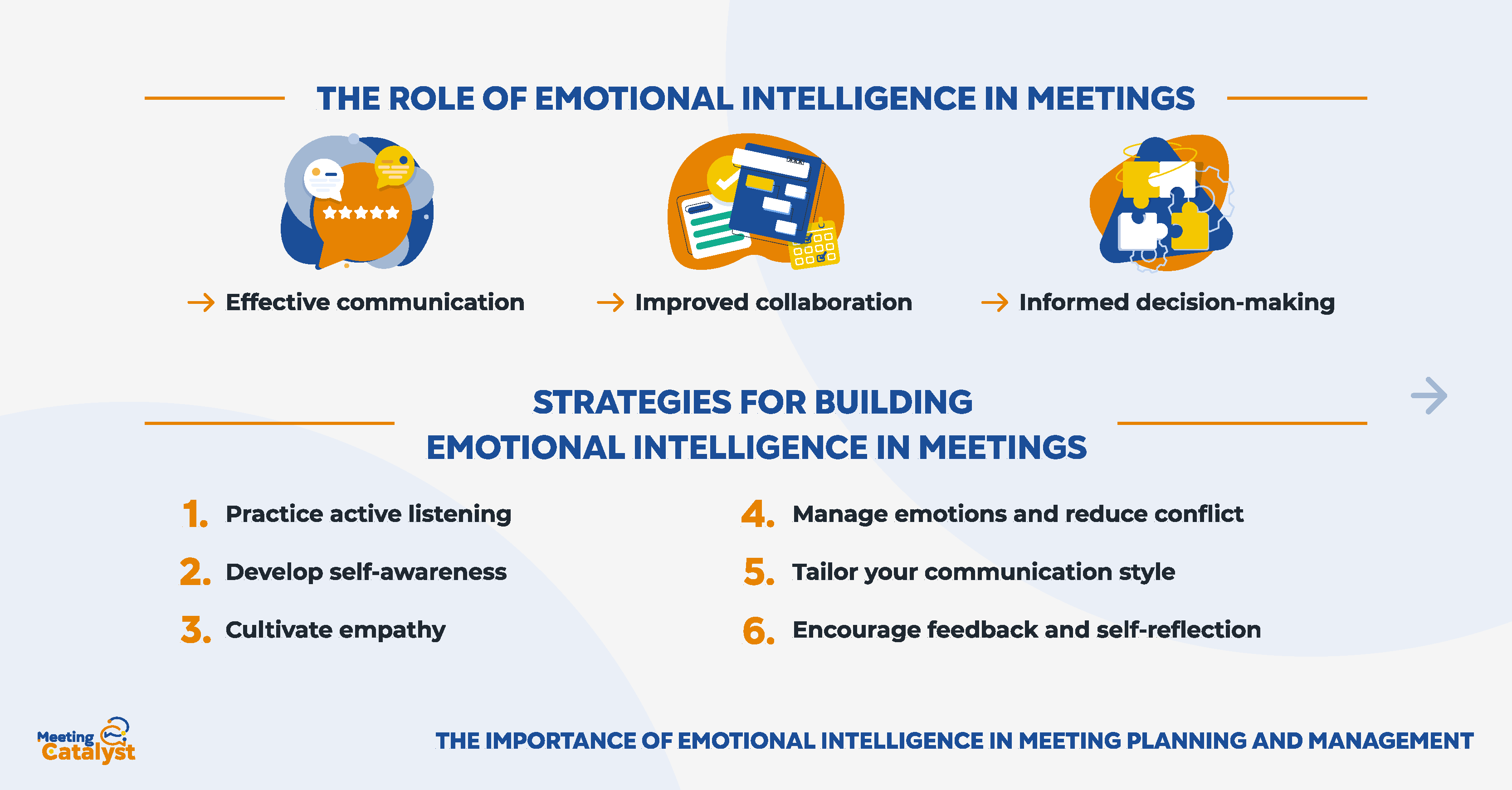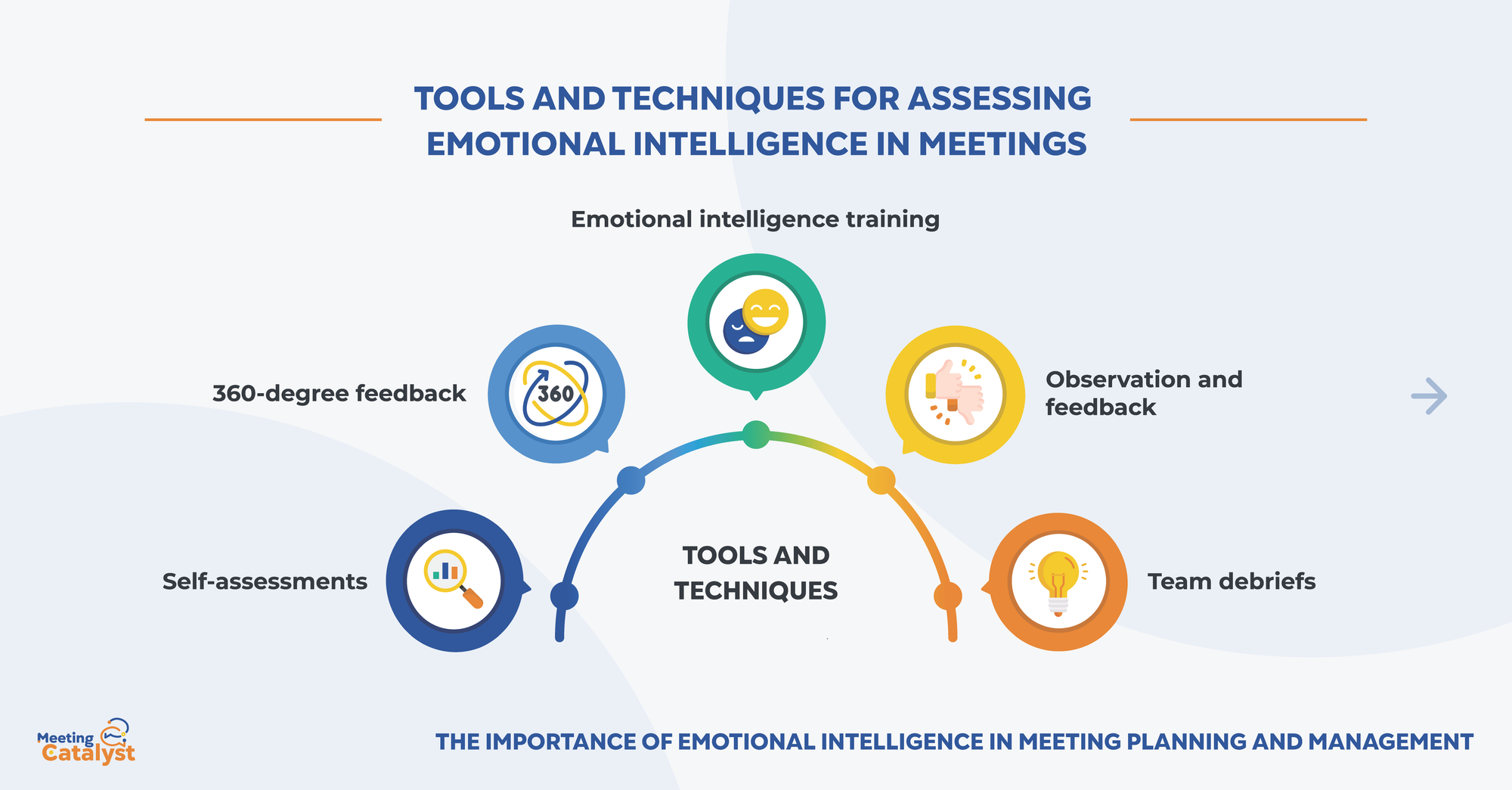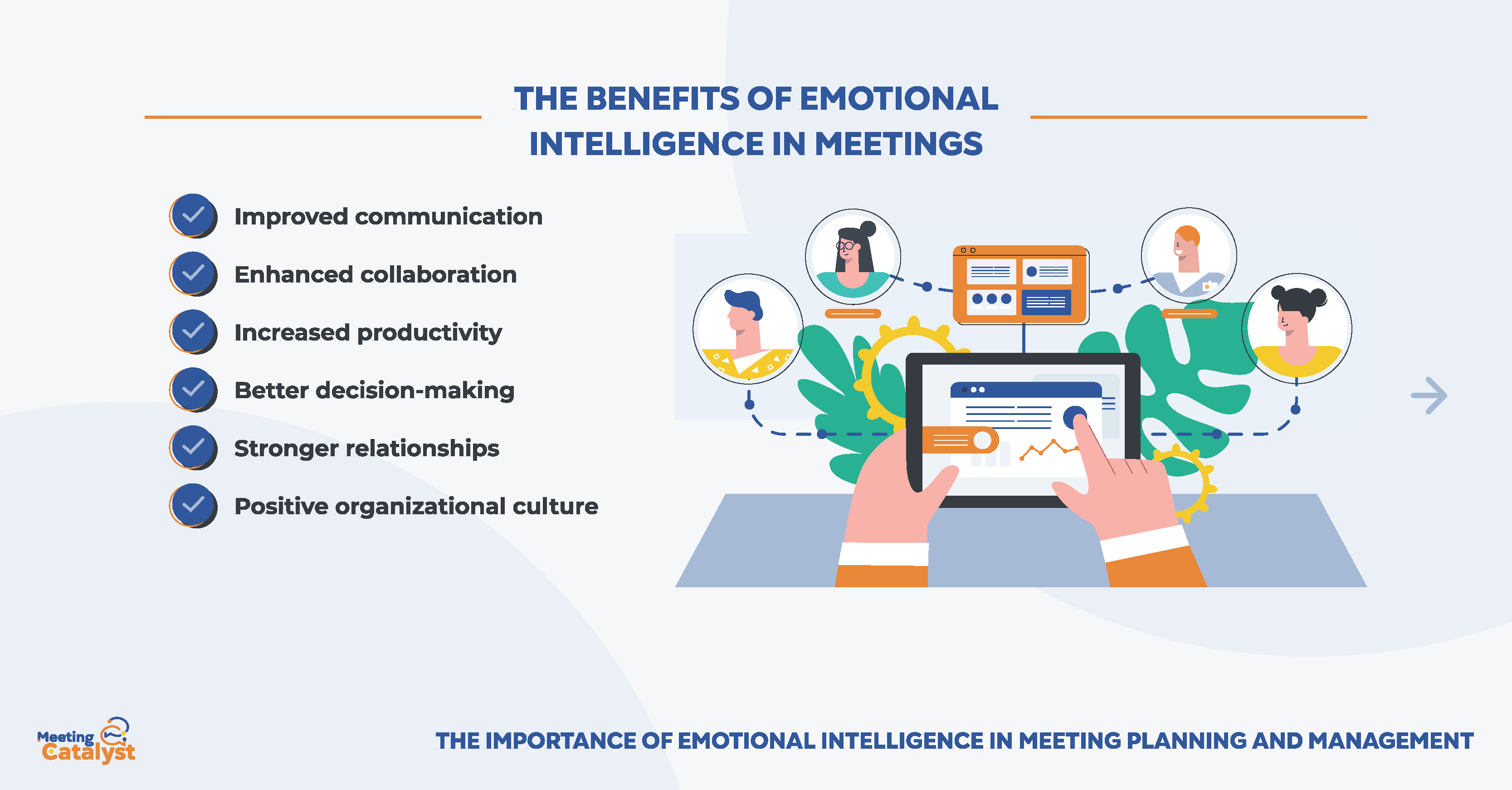The Importance of Emotional Intelligence in Meeting Planning and Management

Introduction
Picture this: You're in a meeting where tensions are high, and opinions are clashing. The atmosphere is becoming increasingly uncomfortable, and the conversation seems to be going nowhere. In situations like these, a high level of emotional intelligence can make all the difference.
Emotional intelligence (EI) is the ability to understand, manage, and express one's emotions effectively while also understanding and empathizing with others' emotions. In today's fast-paced and complex business environment, emotional intelligence is becoming increasingly crucial in navigating challenging situations and fostering collaboration within meetings. In this article, we'll explore the vital role of emotional intelligence in meeting planning and management, discussing how it impacts communication, collaboration, and decision-making. We'll also delve into strategies for building emotional intelligence in meetings, tools for assessing EI, and the lasting benefits of incorporating EI in your meetings.
By understanding and implementing emotional intelligence, you can unlock the potential of your meetings and create an environment that promotes open communication, understanding, and successful outcomes. So, let's dive in and discover how to harness the power of emotional intelligence in your meetings.
What is Emotional Intelligence

Before we delve into the significance of emotional intelligence in meetings, let's first define what it is and understand its key components. Emotional intelligence (EI) refers to the ability to:
- Recognize and understand one's emotions (self-awareness)
- Manage and regulate one's emotions (self-management)
- Understand and empathize with the emotions of others (social awareness)
- Influence and navigate social interactions effectively (relationship management)
It's important to note that emotional intelligence is distinct from IQ (intelligence quotient), which measures cognitive abilities and problem-solving skills. While IQ is essential for technical and analytical tasks, emotional intelligence is crucial for navigating social situations, understanding people, and building relationships.
Let's explore some real-life examples of emotional intelligence in action:
A manager notices that a team member is struggling with their workload and feeling overwhelmed. Instead of dismissing their concerns or reprimanding them for not completing tasks on time, the manager empathizes with their situation, collaborates with them to find a solution, and offers support and guidance.
In a meeting where participants have conflicting opinions, a team leader with high emotional intelligence listens to each perspective, validates their concerns, and facilitates a constructive conversation that ultimately leads to a consensus.
These examples illustrate the power of emotional intelligence in fostering understanding, effective communication, and collaboration. In the next section, we'll delve deeper into the role of emotional intelligence in meetings.
The Role of Emotional Intelligence in Meetings

Now that we understand the concept of emotional intelligence, let's explore its significance in the context of meetings. Emotional intelligence plays a critical role in:
Effective communication: High emotional intelligence allows participants to express themselves clearly, listen actively, and adapt their communication style to the needs of the audience. This leads to a better understanding of the meeting's purpose and the ability to address issues more effectively.
Improved collaboration: Emotionally intelligent team members can empathize with their colleagues, understand different perspectives, and work together to find solutions. They are more likely to build trust, foster a sense of belonging, and encourage open dialogue, all of which contribute to a productive and collaborative environment.
Informed decision-making: When team leaders possess emotional intelligence, they can accurately assess the emotional climate within a meeting, gauge the reactions of team members, and adjust their approach accordingly. This awareness enables them to facilitate discussions that lead to more informed and well-rounded decisions.
Here are some examples of how emotional intelligence can be utilized in meetings:
A project manager notices tension between two team members during a meeting. They use their emotional intelligence to acknowledge the issue and create a safe space for open dialogue, allowing the team members to express their concerns and work towards a resolution.
In a brainstorming session, an emotionally intelligent team leader encourages quieter members to share their ideas, validates their contributions, and ensures that all perspectives are considered.
During a challenging negotiation, a sales manager with high emotional intelligence remains calm and composed, listens carefully to the other party's concerns, and uses empathy to find common ground.
By leveraging emotional intelligence in meetings, team leaders and participants can create more effective, engaging, and successful interactions. In the following section, we'll discuss strategies for building emotional intelligence in meetings.
Strategies for Building Emotional Intelligence in Meetings
Building emotional intelligence is an ongoing process, and there are several strategies that can help you enhance your own EQ and that of your team members during meetings:
Practice active listening: Make a conscious effort to listen attentively to others, avoiding interruptions and distractions. Show that you are engaged by asking relevant questions, summarizing key points, and providing non-verbal cues such as nodding or maintaining eye contact.
Develop self-awareness: Be mindful of your own emotions and reactions during meetings. Acknowledge your feelings, and consider how they may be influencing your thoughts and behaviors. Reflect on your own biases and assumptions, and be open to feedback from others.
Cultivate empathy: Put yourself in others' shoes and try to understand their perspectives, feelings, and motivations. This will help you build stronger connections, encourage open dialogue, and foster a more inclusive meeting environment.
Manage emotions and reduce conflict: Recognize the emotional climate of the meeting, and be prepared to address any tensions or conflicts that may arise. Maintain a calm and composed demeanor, and focus on finding solutions rather than assigning blame.
Tailor your communication style: Adapt your communication style based on the needs and preferences of your audience. Consider factors such as cultural differences, personality types, and the emotional states of meeting participants.
Encourage feedback and self-reflection: Create a safe environment for team members to express their thoughts, feelings, and concerns. Encourage regular feedback and self-reflection, both during and after meetings, to help individuals identify areas for growth and improvement.
By implementing these strategies, you can enhance the emotional intelligence of your team and create more effective, collaborative, and successful meetings. In the next section, we'll explore tools and techniques for assessing emotional intelligence in meetings.
Tools and Techniques for Assessing Emotional Intelligence in Meetings

Assessing emotional intelligence can help you identify areas for growth and improvement, both for individuals and the team as a whole. There are various tools and techniques available to measure and improve emotional intelligence in meetings:
Self-assessments: Encourage team members to complete self-assessments focused on emotional intelligence, such as the Emotional and Social Competency Inventory (ESCI) or the Mayer-Salovey-Caruso Emotional Intelligence Test (MSCEIT). These assessments can help individuals understand their strengths and weaknesses, and create a roadmap for personal development.
360-degree feedback: Implement a 360-degree feedback process, which involves gathering input from peers, managers, and subordinates, to provide a comprehensive view of an individual's emotional intelligence. This approach can reveal blind spots and help team members develop a better understanding of how their behaviors impact others in meetings.
Emotional intelligence training: Provide training sessions, workshops, or online courses that focus on building emotional intelligence skills, such as active listening, empathy, self-awareness, and emotion management. Integrating these skills into meeting management will help improve communication and collaboration.
Observation and feedback: Regularly observe meetings to assess the emotional climate and provide constructive feedback to team members. This can include highlighting positive examples of emotional intelligence in action, as well as identifying areas for improvement.
Team debriefs: After meetings, hold team debriefs to discuss the emotional dynamics that occurred during the meeting. This can help team members reflect on their experiences, learn from one another, and improve their emotional intelligence over time.
By leveraging these tools and techniques, you can foster a culture of continuous learning and improvement when it comes to emotional intelligence in meetings. In the next section, we'll delve into the benefits of emotional intelligence in meetings and its long-term impact on team dynamics and organizational culture.
The Benefits of Emotional Intelligence in Meetings

Emotional intelligence plays a pivotal role in driving productive and successful meetings. By developing and nurturing emotional intelligence within your team, you can unlock a range of benefits that lead to better outcomes and a more positive work environment. Here are some key benefits of emotional intelligence in meetings:
Improved communication: High emotional intelligence enables team members to express their thoughts, ideas, and concerns more effectively, while also being better listeners. This leads to more constructive discussions and the ability to address issues or solve problems more efficiently.
Enhanced collaboration: Emotional intelligence fosters a greater sense of empathy, understanding, and respect among team members. This results in a more collaborative environment where everyone feels valued and heard, enabling the team to work together harmoniously.
Increased productivity: When individuals are more attuned to their emotions and those of others, they can better manage stress, stay focused, and maintain motivation. This translates to increased productivity during meetings, as well as in the workplace as a whole.
Better decision-making: Emotional intelligence helps team members approach decision-making with a balanced perspective, considering both logic and emotions. This leads to more thoughtful and informed decisions that take into account the diverse viewpoints and concerns of all stakeholders.
Stronger relationships: By cultivating emotional intelligence, team members are better equipped to navigate conflicts, resolve disagreements, and build trust with one another. This contributes to stronger working relationships and a more cohesive team dynamic.
Positive organizational culture: When emotional intelligence is a priority in meetings, it creates a ripple effect that influences the broader organizational culture. A positive and emotionally intelligent work environment can result in increased employee engagement, satisfaction, and retention.
By fostering emotional intelligence in your meetings, you can unlock these benefits and set your team on a path toward greater success. In the next section, we'll provide a conclusion that summarizes the importance of emotional intelligence in meeting planning and management, and offers a call-to-action for readers to implement these strategies in their own meetings.
Conclusion
In conclusion, emotional intelligence plays a crucial role in meeting planning and management. By understanding the concept and its components, recognizing its importance in driving effective communication, collaboration, and decision-making, and implementing strategies to build and assess emotional intelligence in meetings, you can create a more positive and productive work environment.
As a business or team leader, it is essential to prioritize the development of emotional intelligence within your team. By doing so, you can reap the benefits of improved communication, enhanced collaboration, increased productivity, better decision-making, stronger relationships, and a positive organizational culture.
Now is the time to take action and start implementing emotional intelligence strategies in your meetings. Remember to practice active listening, self-awareness, empathy, and effective conflict resolution. Use assessments and feedback to measure progress and identify areas for improvement. By embracing emotional intelligence, you will not only elevate the quality of your meetings, but also foster a more supportive, engaged, and successful team.
So, take the first step today and set your team on a path towards greater emotional intelligence, paving the way for more effective meetings and a thriving workplace. The journey may be challenging at times, but the rewards are well worth the effort.